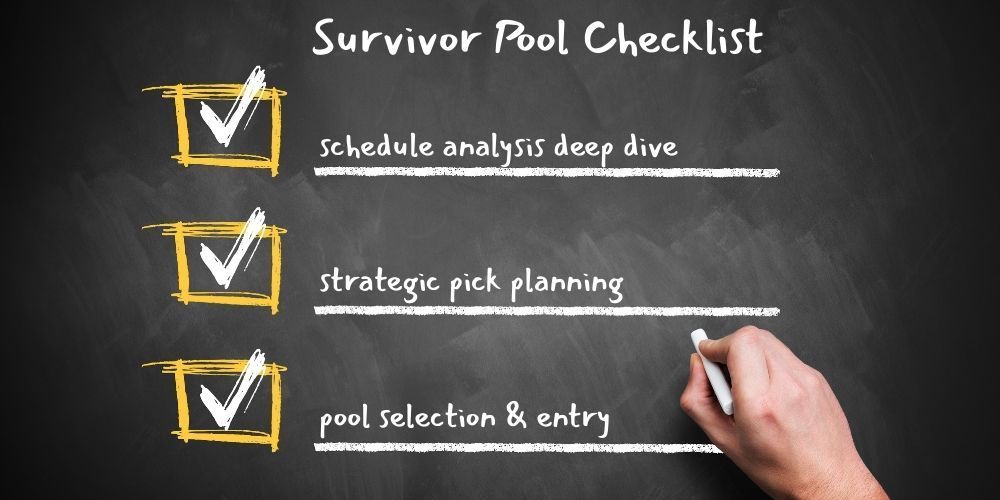How to Research Teams for Survivor Pool Success: A Step-by-Step Guide
William Flaiz • May 6, 2025
NFL survivor pools seem simple on the surface—pick one team to win
each week without repeating picks—but serious players know that thorough team research separates the winners from the also-rans. This comprehensive guide breaks down the
research process into actionable steps that will give you a significant edge in your survivor pool.

Why Team Research Matters in Survivor Pools
Unlike other NFL betting formats, survivor pools require a season-long strategy. Each team you select becomes unavailable for future weeks, making proper research critical not just for the current week but for your entire season plan.
Research helps you:
- Identify true value beyond just betting lines
- Recognize trap games that casual players miss
- Develop a long-term strategy rather than week-to-week reactions
- Make data-driven decisions instead of gut feelings
Step 1: Establish Your Research Foundation
Essential Resources
Before diving into specific team analysis, set up your research toolkit.
Analytical Resources:
- Pro Football Focus - Advanced player and team grades
- Pro Football Reference - Historical stats and matchup data
- Football Outsiders - DVOA and efficiency metrics
Vegas/Betting Resources:
- Vegas Insider - Line movements and betting trends
- Action Network - Public betting percentages
- ESPN BPI - Game predictions and win probabilities
Injury Tracking:
- NFL.com Injuries - Official injury reports
- Rotoworld News - Breaking injury news and analysis
Step 2: Analyze Season-Long Team Strengths and Weaknesses
Start by developing a baseline understanding of each team's overall profile:
- Offensive Efficiency Metrics
- Points per game
- Yards per play
- Third-down conversion rate
- Red zone scoring percentage
- Defensive Performance Indicators
- Points allowed per game
- Yards allowed per play
- Turnover generation
- Opponent third-down conversion rate
- Special Teams Impact
- Field goal accuracy
- Punt/kickoff coverage
- Return game effectiveness
Create a spreadsheet to track these metrics throughout the season, noting significant trends and changes as they develop.
Step 3: Dive Into Weekly Matchup Analysis
After establishing team baselines, focus on specific weekly matchups:
Strength vs. Weakness Assessment
Identify where one team's strength directly exploits another's weakness:
- Does an elite passing offense face a bottom-tier secondary?
- Will a dominant pass rush face an injury-depleted offensive line?
- Does a run-heavy offense match up against a poor run defense?
Situational Factors
Beyond raw stats, consider these critical situational elements:
- Travel Impact
- Teams traveling cross-country for early games (10 AM PT kickoffs for West Coast teams)
- Teams playing three consecutive road games
- Teams traveling after Monday Night Football appearances
- Weather Conditions
- Heavy rain/snow affecting passing games
- Extreme heat impacting player endurance
- High winds affecting kicking and deep passing
- Rest Advantages
- Teams coming off bye weeks
- Thursday night game recovery disparities
- Teams playing on short weeks
Step 4: Monitor Injury Reports and Personnel Changes
Injuries dramatically impact team performance but are often undervalued by casual survivor pool players.
Key Positions to Track:
- Quarterback (obvious but critical)
- Offensive line (particularly left tackle and center)
- Edge rushers and cornerbacks
- Defensive signal-callers (usually linebackers)
Research Tip: Don't just note which players are injured, but understand their replacements. A backup left tackle facing an elite edge rusher could be the difference between a win and loss.
Step 5: Analyze Coaching Tendencies and Preparation
Coaching is a frequently overlooked factor in survivor pools:
- Preparation Patterns
- Coaches' records after bye weeks
- Performance in divisional games vs. non-divisional
- Home/road splits under current coaching staff
- Game Management Tendencies
- Fourth-down aggressiveness
- Clock management in close games
- Adaptability when game plan isn't working
- Staff Changes Impact
- New offensive/defensive coordinators
- Recent play-calling changes
- Coaching staff under pressure
Step 6: Consider Public Perception and Contrarian Opportunities
Understanding how other players are likely to pick creates strategic advantages:
- Track Public Pick Percentages
- Yahoo Survivor Pool Data
- Survivor Grid
- Office Football Pool
- Identify "Public Teams"
- Popular franchises (Cowboys, Packers, etc.)
- Teams coming off prime-time wins
- Teams with star quarterbacks
- Find Contrarian Value
- Home favorites with lower pick percentages
- Teams overlooked due to recent underperformance
- Teams with key returning players casual fans may miss
Step 7: Develop a Forward-Looking Strategy
Unlike weekly betting, survivor pools require long-term planning:
- Map Favorable Matchups Weeks Ahead
- Create a spreadsheet of future matchups
- Identify "save spots" for elite teams
- Find teams with multiple good matchups vs. teams with few
- Future Value Assessment
- Top teams are assets to be used strategically
- Consider when each team's "best matchup" occurs
- Balance immediate needs vs. future opportunities
- Midseason Adaptability
- Reassess team strength as season progresses
- Adjust for injuries, coaching changes, and team trajectory
- Compare your remaining picks to typical pool survival rates
Advanced Research Techniques
Once you've mastered the basics, implement these advanced strategies.
Leverage Analytics for Deeper Insights
- Efficiency Metrics Beyond Basic Stats
- DVOA (Defense-adjusted Value Over Average) by situation
- EPA (Expected Points Added) per play
- Success Rate on early downs
- Situation-Specific Performance
- Red zone efficiency (offensive and defensive)
- Third-and-long conversion rates
- Two-minute drill performance
Psychological and Motivational Factors
- Team Motivation Assessment
- "Must-win" scenarios and playoff implications
- Revenge games against former coaches/players
- Teams playing for coaching staff job security
- Letdown and Look-ahead Spot
- Teams coming off emotional/division wins
- Teams facing rivals in the following week
- Late-season motivation for eliminated teams
Common Research Pitfalls to Avoid
Even experienced survivor pool players make these research mistakes:
- Overvaluing Recent Performance
- Recency bias leads to chasing teams after big wins
- Sample size matters—don't overreact to one game
- Consider longer trends over multiple weeks
- Ignoring Line Movements
- Sharp money can reveal information you've missed
- Significant line moves may indicate insider information
- Pay attention to line movement after injury reports
- Misunderstanding Home Field Advantage
- Not all home fields are equal (dome vs. outdoor, altitude, etc.)
- Fan impact varies greatly by franchise
- Some coaches perform better on the road
Putting It All Together: Weekly Research Routine
Establish a consistent weekly research process:
- Monday/Tuesday: Review past week's results, check early lines, begin planning
- Wednesday: Analyze first injury reports, reassess lines
- Thursday: Finalize early-game selections if necessary
- Friday/Saturday: Review final injury reports, check weather, make adjustments
- Sunday Morning: Last-minute news check before lock (inactive reports)
Learn how the pool size and how it changes throughout the season should impact your strategy,
How Pool Size Affects Your Survivor Strategy: From Small Leagues to Massive Pools.
How much time should I spend researching each week's survivor pick?
Serious survivor pool players typically spend 2-3 hours weekly on research. This includes reviewing statistical matchups, analyzing injury reports, and studying betting line movements. The most successful players distribute this time throughout the week rather than cramming on Sunday morning. Start with 30 minutes on Tuesday to evaluate the upcoming slate, then add incremental research as injury reports and weather forecasts become available later in the week.
Which statistics are most predictive of survivor pool success?
While many stats provide value, research shows that offensive and defensive efficiency metrics outperform basic counting stats. Focus on yards per play (both for and against), third-down conversion rates, and red zone efficiency. These situational metrics provide better insight into team quality than total yards or points, which can be skewed by game script and garbage time. Football Outsiders' DVOA (Defense-adjusted Value Over Average) has proven particularly effective at identifying true team strength that translates to winning games outright.
How should I balance this week's pick versus saving teams for future weeks?
This requires a dynamic approach that changes as the season progresses. Early in the season (Weeks 1-4), prioritize survival over optimization by selecting teams with the highest win probability, even if they might have better matchups later. By midseason (Weeks 5-10), become more strategic with your selections, saving elite teams for prime matchups. In late season (Weeks 11-18), analyze the remaining teams in your pool to determine if you should take more risks to differentiate your picks. The smaller your pool and the fewer entries remaining, the more you should prioritize current-week win probability over future value.












